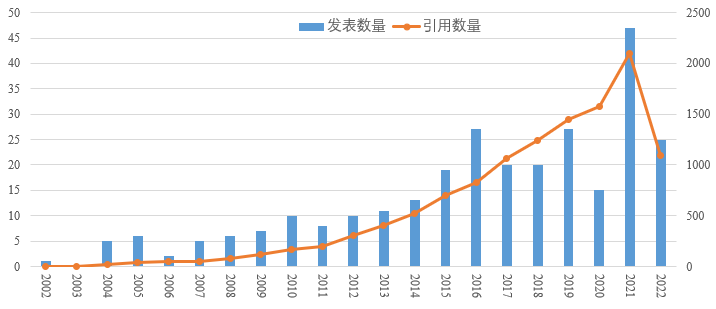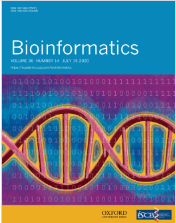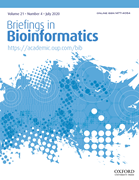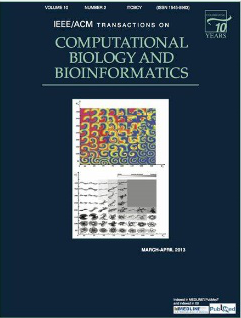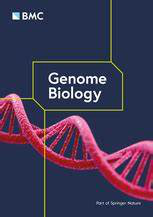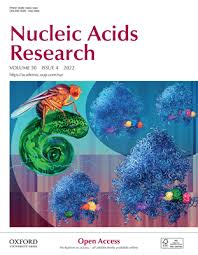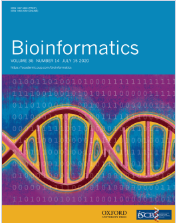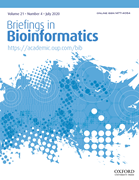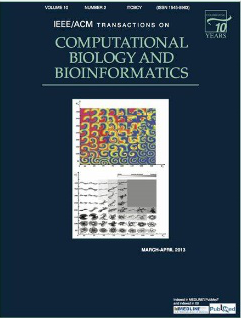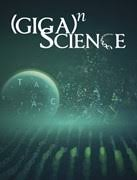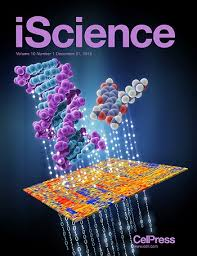2020
1. Li, Junyi, Qingzhe Xu, Mingxiao Wu, Tao Huang, and Yadong Wang. 2020. “Pan-Cancer Classification Based on Self-Normalizing Neural Networks and Feature Selection.” Frontiers in Bioengineering and Biotechnology.
2. Jiang, T., Liu, Y., Jiang, Y. et al. Long-read-based human genomic structural variation detection with cuteSV. Genome Biol 21, 189 (2020). https://doi.org/10.1186/s13059-020-02107-y
3. Li, Junyi, Yuan Ping, Hong Li, Huinian Li, Ying Liu, Bo Liu, and Yadong Wang. 2020. “Prognostic Prediction of Carcinoma by a Differential-Regulatory-Network-Embedded Deep Neural Network.” Computational Biology and Chemistry 88: 107317.
4. Juan, Liran, Yongtian Wang, Jingyi Jiang, Qi Yang, Guohua Wang, and Yadong Wang. 2020. “Evaluating Individual Genome Similarity with a Topic Model.” Bioinformatics.
5. Zhao, Tianyi, Yang Hu, Tianyi Zang, and Yadong Wang. 2020. “Identifying Protein Biomarkers in Blood for Alzheimer’s Disease.” Frontiers in Cell and Developmental Biology 8: 472.
6. Wang, Tao, Qidi Peng, Bo Liu, Yongzhuang Liu, and Yadong Wang. 2020. “Disease Module Identification Based on Representation Learning of Complex Networks Integrated From GWAS, EQTL Summaries, and Human Interactome.” Frontiers in Bioengineering and Biotechnology 8: 418.
7. Peng, Jiajie, Linjiao Zhu, Yadong Wang, and Jin Chen. 2020. “Mining Relationships among Multiple Entities in Biological Networks.” IEEE/ACM Transactions on Computational Biology and Bioinformatics 17 (3): 769–76.
8. Tan, Renjie, Jixuan Wang, Xiaoliang Wu, Liran Juan, Tianjiao Zhang, Rui Ma, Qing Zhan, Tao Wang, Shuilin Jin, and Qinghua Jiang. 2020. “ERDS-Exome: A Hybrid Approach for Copy Number Variant Detection from Whole-Exome Sequencing Data.” IEEE/ACM Transactions on Computational Biology and Bioinformatics 17 (3): 796–803.
9. Zhan, Qing, Yilei Fu, Qinghua Jiang, Bo Liu, Jiajie Peng, and Yadong Wang. 2020. “SpliVert: A Protein Multiple Sequence Alignment Refinement Method Based on Splitting-Splicing Vertically.” Protein and Peptide Letters 27 (4): 295–302.
10. Wang, Shiming, Jie Li, and Yadong Wang. 2020. “WMMDCA: Prediction of Drug Responses by Weight-Based Modular Mapping in Cancer Cell Lines.” IEEE/ACM Transactions on Computational Biology and Bioinformatics, 1–1.
11. Chu, Yanshuo, Chenxi Nie, and Yadong Wang. 2020. “A Pipeline for Reconstructing Somatic Copy Number Alternation’s Subclonal Population-Based Next-Generation Sequencing Data.” Frontiers in Genetics 10: 1374.
12. Wang, Tao, Jiajie Peng, Qidi Peng, Yadong Wang, and Jin Chen. 2020. “FSM: Fast and Scalable Network Motif Discovery for Exploring Higher-Order Network Organizations.” Methods 173: 83–93.
13. Juan, Liran, Yongtian Wang, Jingyi Jiang, Qi Yang, Qinghua Jiang, and Yadong Wang. 2020. “PGsim: A Comprehensive and Highly Customizable Personal Genome Simulator.” Frontiers in Bioengineering and Biotechnology 8: 28.
14. Dengfeng Guan, Shane A McCarthy, Jonathan Wood, Kerstin Howe, Yadong Wang, Richard Durbin, Identifying and removing haplotypic duplication in primary genome assemblies, Bioinformatics, Volume 36, Issue 9, 1 May 2020, Pages 2896–2898, https://doi.org/10.1093/bioinformatics/btaa025
15. Li, Jie, Shiming Wang, Zhuo Chen, and Yadong Wang. 2020. “A Bipartite Network Module-Based Project to Predict Pathogen-Host Association.” Frontiers in Genetics 10: 1357.
16. Li, Jie, Zhuo Chen, and Yadong Wang. 2020. “Contents, Construction Methods, Data Resources, and Functions Comparative Analysis of Bacteria Databases.” International Journal of Biological Sciences 16 (5): 838–48.
17. Wang, Tao, Qidi Peng, Bo Liu, Xiaoli Liu, Yongzhuang Liu, Jiajie Peng, and Yadong Wang. 2020. “EQTLMAPT: Fast and Accurate EQTL Mediation Analysis With Efficient Permutation Testing Approaches.” Frontiers in Genetics 10: 1309.
2019
1. Guo, Hongzhe, Bo Liu, Dengfeng Guan, Yilei Fu, and Yadong Wang. 2019. “Fast Read Alignment with Incorporation of Known Genomic Variants.” BMC Medical Informatics and Decision Making 19 (6): 265.
2. Liu, Bo, Yadong Liu, Junyi Li, Hongzhe Guo, Tianyi Zang, and Yadong Wang. 2019. “DeSALT: Fast and Accurate Long Transcriptomic Read Alignment with de Bruijn Graph-Based Index.” Genome Biology 20 (1): 1–14.
3. Tao Jiang, Bo Liu, Junyi Li, Yadong Wang, rMETL: sensitive mobile element insertion detection with long read realignment, Bioinformatics, Volume 35, Issue 18, 15 September 2019, Pages 3484–3486, https://doi.org/10.1093/bioinformatics/btz106
4. Wang, Yongtian, Liran Juan, Jiajie Peng, Tianyi Zang, and Yadong Wang. 2019. “LncDisAP: A Computation Model for LncRNA-Disease Association Prediction Based on Multiple Biological Datasets.” BMC Bioinformatics 20 (16): 582.
5. Liu, Yongzhuang, Jian Liu, and Yadong Wang. 2019. “Joint Detection of Germline and Somatic Copy Number Events in Matched Tumor-Normal Sample Pairs.” Bioinformatics 35 (23): 4955–61.
6. H. Guo, Y. Fu, Y. Gao, J. Li, Y. Wang and B. Liu, "deGSM: memory scalable construction of large scale de Bruijn Graph," in IEEE/ACM Transactions on Computational Biology and Bioinformatics, doi: 10.1109/TCBB.2019.2913932.
7. T. Jiang, Y. Fu, B. Liu and Y. Wang, "Long-Read Based Novel Sequence Insertion Detection With rCANID," in IEEE Transactions on NanoBioscience, vol. 18, no. 3, pp. 343-352, July 2019, doi: 10.1109/TNB.2019.2908438.
8. Yan Gao, Bo Liu, Yadong Wang, Yi Xing, TideHunter: efficient and sensitive tandem repeat detection from noisy long-reads using seed-and-chain, Bioinformatics, Volume 35, Issue 14, July 2019, Pages i200–i207, https://doi.org/10.1093/bioinformatics/btz376
9. Wang, Zhenxing, and Yadong Wang. 2019. “Extracting a Biologically Latent Space of Lung Cancer Epigenetics with Variational Autoencoders.” BMC Bioinformatics 20 (18): 1–7.
10. Zhan, Qing, Nan Wang, Shuilin Jin, Renjie Tan, Qinghua Jiang, and Yadong Wang. 2019. “ProbPFP: A Multiple Sequence Alignment Algorithm Combining Hidden Markov Model Optimized by Particle Swarm Optimization with Partition Function.” BMC Bioinformatics 20 (18): 1–10.
11. Wang, Yongtian, Liran Juan, Jiajie Peng, Tianyi Zang, and Yadong Wang. 2019. “Prioritizing Candidate Diseases-Related Metabolites Based on Literature and Functional Similarity.” BMC Bioinformatics 20 (18): 1–11.
12. Zhang, Tianjiao, Rongjie Wang, Qinghua Jiang, and Yadong Wang. 2019. “An Information Gain-Based Method for Evaluating the Classification Power of Features Towards Identifying Enhancers.” Current Bioinformatics 14.
13. Liu, Yongzhuang, Jian Liu, and Yadong Wang. 2019. “DNMFilter_Indel: Filtering de Novo Indels in Parent-Offspring Trios.” In 2019 IEEE International Conference on Bioinformatics and Biomedicine (BIBM), 1758–61.
14. Wang, Tao, Junpeng Ruan, Quanwei Yin, Xianjun Dong, and Yadong Wang. 2019. “An Automated Quality Control Pipeline for EQTL Analysis with RNA-Seq Data.” In 2019 IEEE International Conference on Bioinformatics and Biomedicine (BIBM), 1780–86.
15. Quan, Wei, Bo Liu, and Yadong Wang. 2019. “SALT: A Fast, Memory-Efficient and SNP-Aware Short Read Alignment Tool.” In 2019 IEEE International Conference on Bioinformatics and Biomedicine (BIBM), 1774–79.
16. Quan, Wei, Guangri Quan, Bo Liu, and Yadong Wang. 2019. “A Bidirectional Fuzzy Index and Approximate Search Algorithm for Next Generation Sequencing.” In 2019 IEEE International Conference on Bioinformatics and Biomedicine (BIBM), 293–97.
17. Li, Jie, Zhun Zhao, Li Zhou, and Yadong Wang. 2019. “Y-SPCR: A New Dimensionality Reduction Method for Gene Expression Data Classification.” In 2019 IEEE International Conference on Bioinformatics and Biomedicine (BIBM), 401–8.
18. Zhao, Tianyi, Yang Hu, Tianyi Zang, and Yadong Wang. 2019. “Integrate GWAS, EQTL, and MQTL Data to Identify Alzheimer’s Disease-Related Genes.” Frontiers in Genetics 10: 1021–1021.
19. Wang, Rongjie, Tianyi Zang, and Yadong Wang. 2019. “Human Mitochondrial Genome Compression Using Machine Learning Techniques.” Human Genomics 13 (1): 49.
20. Wang, Yongtian, Chenxi Nie, Tianyi Zang, and Yadong Wang. 2019. “Predicting CircRNA-Disease Associations Based on CircRNA Expression Similarity and Functional Similarity.” Frontiers in Genetics 10: 832–832.
21. Li, Jie, Qiaosheng Zhang, Zhuo Chen, Dechen Xu, and Yadong Wang. 2019. “A Network-Based Pathway-Extending Approach Using DNA Methylation and Gene Expression Data to Identify Altered Pathways.” Scientific Reports 9 (1): 11853.
22. Li, Junyi, Huinian Li, Li Zhang, Qingzhe Xu, Yuan Ping, Xiaozhu Jing, Wei Jiang, Bo Liu, and Yadong Wang. 2019. “Prediction of Human LncRNAs Based on Integrated Information Entropy Features.” In International Conference on Intelligent Computing, 333–43.
23. Li, Junyi, Li Zhang, Huinian Li, Yuan Ping, Qingzhe Xu, Rongjie Wang, Renjie Tan, Zhen Wang, Bo Liu, and Yadong Wang. 2019. “Integrated Entropy-Based Approach for Analyzing Exons and Introns in DNA Sequences.” BMC Bioinformatics 20 (8): 283–283.
24. Sun, Mingrui, Tengfei Min, Tianyi Zang, and Yadong Wang. 2019. “CDL4CDRP: A Collaborative Deep Learning Approach for Clinical Decision and Risk Prediction.” Processes 7 (5): 265.
25. Sun, Yanran, Qiaosheng Zhang, Guoshuang Feng, Zhen Chen, Chao Gao, Shuguang Liu, Ruidong Zhang, Han Zhang, Xueling Zheng, and Wenyu Gong. 2019. “An Improved Advanced Fragment Analysis-Based Classification and Risk Stratification of Pediatric Acute Lymphoblastic Leukemia.” Cancer Cell International 19 (1): 110.
26. Li, Jie, Dong Wang, and Yadong Wang. 2019. “IBI: Identification of Biomarker Genes in Individual Tumor Samples.” Frontiers in Genetics 10: 1236.
27. Zhao, Tianyi, Donghua Wang, Yang Hu, Ningyi Zhang, Tianyi Zang, and Yadong Wang. 2019. “Identifying Alzheimer’s Disease-Related MiRNA Based on Semi-Clustering.” Current Gene Therapy 19 (4): 216–23.
28. L. Wang, X. Wang and Y. Wang, "An Approximate Bufferless Network-on-Chip," in IEEE Access, vol. 7, pp. 141516-141532, 2019, doi: 10.1109/ACCESS.2019.2943922.
2018
1. Chu, Yan-Shuo, Mingxiang Teng, and Yadong Wang. 2019. “Simulating Genetically Heterozygous Genomes in the Tumour Tissue According to Its Clonal Evolution History.” International Journal of Computational Biology and Drug Design 12 (2): 143–52.
2. Wang, Dong, Jie Li, Rui Liu, and Yadong Wang. 2018. “Optimizing Gene Set Annotations Combining GO Structure and Gene Expression Data.” BMC Systems Biology 12 (9): 133.
3. Wang, Zhenxing, and Yadong Wang. 2018. “Exploring DNA Methylation Data of Lung Cancer Samples with Variational Autoencoders.” In 2018 IEEE International Conference on Bioinformatics and Biomedicine (BIBM), 1286–89.
4. Guan, Dengfeng, Bo Liu, and Yadong Wang. 2018. “DeSPI: Efficient Classification of Metagenomics Reads with Lightweight de Bruijn Graph-Based Reference Indexing.” In 2018 IEEE International Conference on Bioinformatics and Biomedicine (BIBM), 265–69.
5. Wang, Yongtian, Liran Juan, Chunpu Liu, Tianyi Zang, and Yadong Wang. 2018. “Identifying Candidate Diseases-Related Metabolites Based on Disease Similarity.” In 2018 IEEE International Conference on Bioinformatics and Biomedicine (BIBM), 1281–85.
6. Guo, Hongzhe, Bo Liu, Dengfeng Guan, Yilei Fu, and Yadong Wang. 2018. “Fast Variation-Aware Read Alignment with DeBGA-VARA.” In 2018 IEEE International Conference on Bioinformatics and Biomedicine (BIBM), 227–33.
7. Zhan, Qing, Nan Wang, Shuilin Jin, Renjie Tan, Qinghua Jiang, and Yadong Wang. 2018. “ProbPFP: A Multiple Sequence Alignment Algorithm Combining Partition Function and Hidden Markov Model with Particle Swarm Optimization.” In 2018 IEEE International Conference on Bioinformatics and Biomedicine (BIBM), 1290–95.
8. Wang, Fuxu, Mingrui Sun, Tengfei Min, Yueying Wang, Chunpu Liu, Tianyi Zang, and Yadong Wang. 2018. “Analysis for Early Seizure Detection System Based on Deep Learning Algorithm.” In 2018 IEEE International Conference on Bioinformatics and Biomedicine (BIBM), 2382–89.
9. Wang, Yongtian, Liran Juan, Jiajie Peng, Tianyi Zang, and Yadong Wang. 2018. “Predicting Candidate Disease-Related LncRNAs Based on Network Random Walk.” In 2018 IEEE International Conference on Bioinformatics and Biomedicine (BIBM), 524–31.
10. Wang, Ling, and Yadong Wang. 2018. “A Network-on-Chip Accelerator for Genome Variant Analysis.” In 2018 IEEE International Conference on Bioinformatics and Biomedicine (BIBM), 775–79.
11. Wang, Rongjie, Yang Bai, Yan-Shuo Chu, Zhenxing Wang, Yongtian Wang, Mingrui Sun, Junyi Li, Tianyi Zang, and Yadong Wang. 2018. “DeepDNA: A Hybrid Convolutional and Recurrent Neural Network for Compressing Human Mitochondrial Genomes.” In 2018 IEEE International Conference on Bioinformatics and Biomedicine (BIBM), 270–74.
12. Chu, Yanshuo, Chenxi Nie, and Yadong Wang. 2018. “P-SCNAClonal: Somatic Copy Number Alterations Based Tumor Subclonal Population Inferring Method.” In 2018 IEEE International Conference on Bioinformatics and Biomedicine (BIBM), 1693–98.
13. Sun, Mingrui, Fuxu Wang, Tengfei Min, Tianyi Zang, and Yadong Wang. 2018. “Prediction for High Risk Clinical Symptoms of Epilepsy Based on Deep Learning Algorithm.” IEEE Access 6: 77596–605.
14. Wang, Rongjie, Junyi Li, Yang Bai, Tianyi Zang, and Yadong Wang. 2018. “BdBG: A Bucket-Based Method for Compressing Genome Sequencing Data with Dynamic de Bruijn Graphs.” PeerJ 6.
15. Peng, Jiajie, Hansheng Xue, Weiwei Hui, Junya Lu, Bolin Chen, Qinghua Jiang, Xuequn Shang, and Yadong Wang. 2018. “An Online Tool for Measuring and Visualizing Phenotype Similarities Using HPO.” BMC Genomics 19 (6): 89–97.
16. Xue, Hanqing, Jie Li, Haozhe Xie, and Yadong Wang. 2018. “Review of Drug Repositioning Approaches and Resources.” International Journal of Biological Sciences 14 (10): 1232–44.
17. Wang, Zhenxing, XiaoLiang Wu, and Yadong Wang. 2018. “A Framework for Analyzing DNA Methylation Data from Illumina Infinium HumanMethylation450 BeadChip.” BMC Bioinformatics 19 (5): 115.
18. Chu, Yanshuo, Mingxiang Teng, and Yadong Wang. 2018. “Modeling and Correct the GC Bias of Tumor and Normal WGS Data for SCNA Based Tumor Subclonal Population Inferring.” BMC Bioinformatics 19 (5): 112–112.
19. Wang, Guohua, Ximei Luo, Jianan Wang, Jun Wan, Shuli Xia, Heng Zhu, Jiang Qian, and Yadong Wang. 2018. “MeDReaders: A Database for Transcription Factors That Bind to Methylated DNA.” Nucleic Acids Research 46.
2017
1. Cui, Xiao-fei, Ya-dong Wang, Guang-ri Quan, Yong-dong Xu, and Shawn X. Wang. 2017. “K-Mer Similarity: A Rapid Similarity Search Algorithm for Probe Design.” In .
2. Peng, Jiajie, Honggang Wang, Junya Lu, Weiwei Hui, Yadong Wang, and Xuequn Shang. 2017. “Identifying Term Relations Cross Different Gene Ontology Categories.” BMC Bioinformatics 18 (16): 573–573.
3. Wang, Yongtian, Liran Juan, Yanshuo Chu, Rongjie Wang, Tianyi Zang, and Yadong Wang. 2017. “FNSemSim: An Improved Disease Similarity Method Based on Network Fusion.” In 2017 IEEE International Conference on Bioinformatics and Biomedicine (BIBM), 630–33.
4. Chu, Yanshuo, Mingxiang Teng, Zhenxing Wang, Yongtian Wang, and Yadong Wang. 2017. “Pre-SCNAClonal: Efficient GC Bias Correction for SCNA Based Tumor Subclonal Populations Inferring.” In 2017 IEEE International Conference on Bioinformatics and Biomedicine (BIBM), 262–65.
5. Wang, Rongjie, Yang Bai, Qianlong Cheng, Tianyi Zang, and Yadong Wang. 2017. “A Bucket Index Correction Based Method for Compression of Genomic Sequencing Data.” In 2017 IEEE International Conference on Bioinformatics and Biomedicine (BIBM), 634–37.
6. Wang, Zhenxing, Yanshuo Chu, Yongtian Wang, and Yadong Wang. 2017. “A Framework for Analyzing DNA Methylation Data from Illumina Infinium HumanMethylation450 BeadChip.” In 2017 IEEE International Conference on Bioinformatics and Biomedicine (BIBM), 1688–93.
7. Chu, Yanshuo, Ling Wang, Rongjie Wang, Mingxiang Teng, and Yadong Wang. 2017. “Pysubsim-Tree: A Package for Simulating Tumor Genomes According to Tumor Evolution History.” In 2017 IEEE International Conference on Bioinformatics and Biomedicine (BIBM), 2195–97.
8. Chu, Yanshuo, Zhenxing Wang, Rongjie Wang, Ningyi Zhang, Jie Li, Yang Hu, Mingxiang Teng, and Yadong Wang. 2017. “WDNfinder: A Method for Minimum Driver Node Set Detection and Analysis in Directed and Weighted Biological Network.” Journal of Bioinformatics and Computational Biology 15 (5): 1750021.
9. Zhang, Qiaosheng, Jie Li, Dong Wang, and Yadong Wang. 2017. “Finding Disagreement Pathway Signatures and Constructing an Ensemble Model for Cancer Classification.” Scientific Reports 7 (1): 10044.
10. Peng, Jiajie, Hansheng Xue, Yukai Shao, Xuequn Shang, Yadong Wang, and Jin Chen. 2017. “A Novel Method to Measure the Semantic Similarity of HPO Terms.” International Journal of Data Mining and Bioinformatics 17 (2): 173–88.
11. Wang, Zhuo, Shuilin Jin, Guiyou Liu, Xiurui Zhang, Nan Wang, Deliang Wu, Yang Hu, Chiping Zhang, Qinghua Jiang, and Li Xu. 2017. “DTWscore: Differential Expression and Cell Clustering Analysis for Time-Series Single-Cell RNA-Seq Data.” BMC Bioinformatics 18 (1): 270.
12. Zhang, Xinjun, Meng Li, Hai Lin, Xi Rao, Weixing Feng, Yuedong Yang, Matthew Mort, David N. Cooper, Yue Wang, and Yadong Wang. 2017. “RegSNPs-Splicing: A Tool for Prioritizing Synonymous Single-Nucleotide Substitution.” Human Genetics 136 (9): 1279–89.
13. Peng, Jiajie, Hongxiang Li, Yongzhuang Liu, Liran Juan, Qinghua Jiang, Yadong Wang, and Jin Chen. 2017. “Erratum to: InteGO2: A Web Tool for Measuring and Visualizing Gene Semantic Similarities Using Gene Ontology.” BMC Genomics 18 (1): 262–262.
14. Peng, Jiajie, Kun Bai, Xuequn Shang, Guohua Wang, Hansheng Xue, Shuilin Jin, Liang Cheng, Yadong Wang, and Jin Chen. 2017. “Predicting Disease-Related Genes Using Integrated Biomedical Networks.” BMC Genomics 18 (1): 1043–1043.
15. Yao, Haobin, Tak Wah Lam, H. F. Ting, Siu-Ming Yiu, Yadong Wang, and Bo Liu. 2017. “Accurate Annotation of Metagenomic Data without Species-Level References.” International Journal of Data Mining and Bioinformatics 19 (4): 283–97.
2016
1. Zhang, Qiaosheng, Jie Li, Haozhe Xie, Hanqing Xue, and Yadong Wang. 2016. “A Network-Based Pathway-Expanding Approach for Pathway Analysis.” BMC Bioinformatics 17 (17): 536–536.
2. Zhou, Ao, Yadong Wang, Yunlong Liu, Weixing Feng, and Howard J. Edenberg. 2016. “Characterizing the Roles of Long Non-Coding RNA in Rat Alcohol Preference.” In 2016 IEEE International Conference on Bioinformatics and Biomedicine (BIBM), 167–73.
3. Xie, Haozhe, Jie Li, Qiaosheng Zhang, and Yadong Wang. 2016. “Comparison among Dimensionality Reduction Techniques Based on Random Projection for Cancer Classification.” Computational Biology and Chemistry 65: 165–72.
4. Hu, Yang, Lingling Zhao, Zhiyan Liu, Hong Ju, Hongbo Shi, Peigang Xu, Yadong Wang, and Liang Cheng. 2016. “DisSetSim: An Online System for Calculating Similarity between Disease Sets.” In 2016 IEEE International Conference on Bioinformatics and Biomedicine (BIBM), 8:28.
5. Yao, Haobin, Tak Wah Lam, H. F. Ting, Siu-Ming Yiu, Yadong Wang, and Bo Liu. 2017. “Accurate Annotation of Metagenomic Data without Species-Level References.” International Journal of Data Mining and Bioinformatics 19 (4): 283–97.
6. Peng, Jiajie, Hansheng Xue, Yukai Shao, Xuequn Shang, Yadong Wang, and Jin Chen. 2016. “Measuring Phenotype Semantic Similarity Using Human Phenotype Ontology.” In 2016 IEEE International Conference on Bioinformatics and Biomedicine (BIBM), 763–66.
7. Tan, Renjie, Jixuan Wang, Xiaoliang Wu, Guoqiang Wan, Rongjie Wang, Rui Ma, Zhijie Han, Wenyang Zhou, Shuilin Jin, and Qinghua Jiang. 2016. “ERDS-Pe: A Paired Hidden Markov Model for Copy Number Variant Detection from Whole-Exome Sequencing Data.” In 2016 IEEE International Conference on Bioinformatics and Biomedicine (BIBM), 141–44.
8. Wang, Rongjie, Mingxiang Teng, Yang Bai, Tianyi Zang, and Yadong Wang. 2016. “DMcompress: Dynamic Markov Models for Bacterial Genome Compression.” In 2016 IEEE International Conference on Bioinformatics and Biomedicine (BIBM), 776–79.
9. Liu, Bo, Hongzhe Guo, Michael Brudno, and Yadong Wang. 2016. “DeBGA: Read Alignment with de Bruijn Graph-Based Seed and Extension.” Bioinformatics 32 (21): 3224–32.
10. Zhu, Shijia, and Yadong Wang. 2016. “Hidden Markov Induced Dynamic Bayesian Network for Recovering Time Evolving Gene Regulatory Networks.” Scientific Reports 5 (1): 17841–17841.
11. Guan, Dengfeng, Bo Liu, and Yadong Wang. 2016. “DeSPI: Efficient Classification of Metagenomic Reads with Lightweight de Bruijn Graph-Based Reference Indexing.” BioRxiv, 80200.
12. Peng, Jiajie, Hongxiang Li, Yongzhuang Liu, Liran Juan, Qinghua Jiang, Yadong Wang, and Jin Chen. 2016. “InteGO2: A Web Tool for Measuring and Visualizing Gene Semantic Similarities Using Gene Ontology.” BMC Genomics 17 (5): 530–530.
13. Hu, Yang, Ying Zhang, Jun Ren, Yadong Wang, Zhenzhen Wang, and Jun Zhang. 2016. “Statistical Approaches for the Construction and Interpretation of Human Protein-Protein Interaction Network.” BioMed Research International 2016: 5313050.
14. Feng, Weixing, Sen Zhao, Dingkai Xue, Fengfei Song, Ziwei Li, Duojiao Chen, Bo He, Yangyang Hao, Yadong Wang, and Yunlong Liu. 2016. “Improving Alignment Accuracy on Homopolymer Regions for Semiconductor-Based Sequencing Technologies.” BMC Genomics 17 (7): 521.
15. Hu, Yang, Wenyang Zhou, Jun Ren, Lixiang Dong, Yadong Wang, Shuilin Jin, and Liang Cheng. 2016. “Annotating the Function of the Human Genome with Gene Ontology and Disease Ontology.” BioMed Research International 2016: 4130861.
16. Feng, Weixing, Sen Zhao, Dingkai Xue, Fengfei Song, Ziwei Li, Duojiao Chao, Bo He, Yangyang Hao, Yadong Wang, and Yunlong Liu. 2016. “Improving Alignment Accuracy on Homopolymer Regions for Semiconductor-Based Sequencing Technologies.” PMC.
17. Shen, Changyu, Yang Hu, Xiaochun Li, Yadong Wang, Peng-Sheng Chen, and Alfred E. Buxton. 2016. “Identification of Subpopulations with Distinct Treatment Benefit Rate Using the Bayesian Tree.” Biometrical Journal 58 (6): 1357–75.
18. Zhang, Tianjiao, Yang Hu, Xiaoliang Wu, Rui Ma, Qinghua Jiang, and Yadong Wang. 2016. “Identifying Liver Cancer-Related Enhancer SNPs by Integrating GWAS and Histone Modification ChIP-Seq Data.” BioMed Research International 2016: 2395341–2395341.
19. Liu, Bo, Dixian Zhu, and Yadong Wang. 2016. “DeBWT: Parallel Construction of Burrows–Wheeler Transform for Large Collection of Genomes with de Bruijn-Branch Encoding.” Bioinformatics 32 (12): 174–82.
20. Liu, Bo, Dengfeng Guan, Mingxiang Teng, and Yadong Wang. 2016. “RHAT: Fast Alignment of Noisy Long Reads with Regional Hashing.” Bioinformatics 32 (11): 1625–31.
21. Zhang, Tianjiao, Yue Jiang, Liang Cheng, Yang Hu, and Yadong Wang. 2016. “Latent Semantic Analysis- and Hierarchical Clustering-Based Method for Detecting Remote Protein Homology.” Current Proteomics 13 (2): 92–98.
22. Peng, Jiajie, Tao Wang, Jixuan Wang, Yadong Wang, and Jin Chen. 2016. “Extending Gene Ontology with Gene Association Networks.” Bioinformatics 32 (8): 1185–94.
23. Liu, Yongzhuang, Jian Liu, Jianguo Lu, Jiajie Peng, Liran Juan, Xiaolin Zhu, Bingshan Li, and Yadong Wang. 2016. “Joint Detection of Copy Number Variations in Parent-Offspring Trios.” Bioinformatics 32 (8): 1130–37.
24. Zhang, Qiaosheng, Jie Li, Hanqing Xue, Leilei Kong, and Yadong Wang. 2016. “Network-Based Methods for Identifying Critical Pathways of Complex Diseases: A Survey.” Molecular BioSystems 12 (4): 1082–89.
25. Ontology, Gene, Jiajie Peng, Yongzhuang Liu, Liran Juan, Qinghua Jiang, Yadong Wang, and Jin Chen. 2016. “InteGO2: A Web Tool for Measuring and Visualizing Gene Semantic Similarities Using.”
